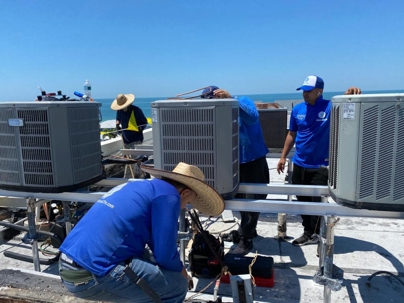Selecting the right air conditioning technician can significantly improve the efficiency and longevity of your residential or commercial HVAC system. At Momentum AC & Electric., located in St. Petersburg, we understand the intricate role of skilled AC technicians in maintaining optimal indoor comfort.
The role of an air conditioning technician entails a wide range of responsibilities specifically geared towards installing, maintaining, and repairing HVAC systems. Technicians ensure that your air conditioning units operate smoothly and play a crucial role in calibrating these systems for energy efficiency. Momentum AC & Electric – St. Petersburg technicians are trained to handle installations and repairs efficiently, leaving you with a functioning system tailored to your needs.
Air conditioning technicians are more crucial than ever in modern living conditions, especially in regions with high humidity and temperature. The increasing reliance on climate control systems has also resulted in a surge in demand for qualified technicians. Their profound knowledge and expertise enhance comfort levels and contribute significantly to energy conservation. Hiring professionals allows homeowners and businesses to avoid common HVAC pitfalls, such as inefficient cooling, which can lead to skyrocketing energy costs.
What Does an Air Conditioning Technician Do?
Air conditioning technicians are responsible for many tasks that keep HVAC systems operational and efficient. One of their primary functions is installing air conditioning systems. This involves assessing a space’s specific cooling needs and recommending the appropriate units, whether central air conditioning systems, ductless mini-splits, or portable units.
Installation is just the beginning; AC technicians’ ongoing repair and maintenance tasks are equally important. Regular maintenance ensures that all components function correctly and efficiently and helps prevent unexpected breakdowns. This involves cleaning filters, tightening electrical connections, and checking refrigerant levels. Troubleshooting common AC problems is another vital competency of air conditioning technicians. They employ diagnostic techniques to identify and rectify system issues, ensuring clients maintain comfortable indoor conditions throughout the year.
Skills Required for an Air Conditioning Technician
An air conditioning technician needs unique skills to perform their job effectively. The first requirement is technical expertise, which encompasses a thorough knowledge of HVAC systems and their components. This includes understanding the scientific principles of heating and cooling and familiarity with the latest industry technologies.
Problem-solving skills are also crucial. Technicians often face unexpected issues that require quick thinking and analytical skills to diagnose and resolve. At Momentum AC & Electric, our team excels in this area, providing accurate solutions that minimize downtime for your HVAC systems.
Physical stamina and dexterity are equally crucial for technicians who work in tight spaces or at great heights. They must lift heavy equipment and handle tools and machinery with precision. This physical aspect of the job ensures that they can complete installations and repairs efficiently while adhering to safety protocols.
Education and Training
To become a successful air conditioning technician, one must meet specific educational and training requirements. A high school diploma or GED is typically required as a foundation for further education. Many aspiring technicians pursue post-secondary technical education to gain specialized HVAC training.
Technical schools or community colleges offer programs specifically geared toward HVAC technology. These programs cover installation procedures, electrical systems, and refrigeration principles. Additionally, hands-on apprenticeships provide practical experience that solidifies the knowledge gained in the classroom.
Certifications and licenses are also essential components of an HVAC technician’s qualifications. Obtaining certifications from recognized organizations demonstrates that a technician has met industry standards, enhancing their credibility and employability.
Types of Air Conditioning Systems
Different types of air conditioning systems require different installation and maintenance approaches. Central AC units are among the most common residential settings, providing comprehensive cooling through ductwork. Technicians must ensure proper sizing and efficiency for these systems to function effectively.
Ductless mini-split systems have gained prevalence due to their flexibility and ease of installation, particularly in spaces without existing ductwork. Knowing how to install and maintain these units is a valuable skill set.
While often considered less permanent solutions, windows, and portable AC units still require professional installation and regular maintenance. Technicians must understand how to position and operate these units for optimal performance within a specific environment.
Common AC Problems and How Technicians Fix Them
Refrigerant leaks are one of the most prevalent issues in air conditioning systems. Technicians are trained to identify leak locations, repair them, and recharge refrigerant levels to ensure the system operates effectively. Prompt action on these leaks is crucial to maintain efficiency and avoid costly damage.
Compressor failures are another common problem; these can stem from various issues, including electrical or physical obstructions. Our Momentum AC & Electric – St. Petersburg technicians have the skills to troubleshoot and determine the best course of action, whether it requires repair or replacement.
Electrical issues frequently arise, affecting everything from the thermostat to the motor. These problems can often be complex, requiring a skilled technician to diagnose them and safely manage the appropriate repairs.
Tools Used by AC Technicians
Various tools are crucial for HVAC technicians to perform their tasks efficiently.
Refrigerant gauges are essential since they measure the pressure of the refrigerant within a system, allowing technicians to assess if the levels are within the recommended limits.
Multimeters measure electrical current, voltage, and resistance, which helps technicians diagnose electrical issues effectively.
Leak detectors identify refrigerant leaks, a key component of maintaining HVAC systems’ efficiency and safety. Using these specialized tools, technicians can provide prompt and accurate service for all air conditioning needs.
The Importance of Regular Maintenance
Regular maintenance is vital for ensuring the good health of any HVAC system. One of the most significant benefits is preventing costly repairs; routine maintenance can identify minor problems before they evolve into major issues that may require expensive repairs or complete system replacements.
Moreover, regular maintenance improves energy efficiency. A well-maintained AC system runs more effectively, utilizing less energy to cool spaces and resulting in lower utility bills.
Extending the lifespan of the HVAC unit also hinges on regular maintenance. By addressing wear and tear promptly and ensuring all components are functioning correctly, technicians can help prevent premature system failures.
Work Environment and Job Outlook
Air conditioning technicians typically find work in various settings, including homes, offices, and industrial buildings. This diversity in the workplace gives technicians a chance to work in different environments and with various clientele.
The demand for AC technicians continues to grow, especially as more individuals and businesses prioritize climate control in their spaces. The Bureau of Labor Statistics anticipates that employment in heating, air conditioning, refrigeration mechanics, and installers will keep pace with industry advancements.
Salary expectations vary based on location, experience, and type of work performed. However, HVAC technicians generally earn competitive wages that increase with experience and additional certifications.
Challenges Faced by AC Technicians
HVAC technicians face several challenges daily, including working in extreme weather conditions. During peak summer or winter seasons, they often must endure hot or cold temperatures, which strains their physical abilities and mental stamina.
Additionally, technicians frequently deal with hazardous materials, including refrigerants and chemicals, that must be handled carefully. Awareness of safety protocols and proper handling techniques is vital to prevent accidents or health risks.
The physical demands of the job can also be taxing. Technicians often have to lift heavy equipment, crawl into tight spaces, or work at heights. Maintaining physical fitness and learning proper techniques for lifting and maneuvering equipment are essential for long-term success in the industry.
Advantages of Becoming an AC Technician
Becoming an air conditioning technician presents numerous advantages. One of the most prominent is job security; as HVAC systems break down and require maintenance, the need for qualified technicians will continue to grow.
There aren’t just job opportunities but also ample avenues for career advancement. Many technicians expand their skill sets over time, leading to roles in management, specialized technical positions, or entrepreneurship.
Finally, the hands-on nature of the work is appealing to many. Unlike desk jobs, HVAC work allows technicians to engage actively with people and technology, solving real-world problems and making a tangible difference in clients’ comfort levels.
Steps to Become an Air Conditioning Technician
Aspiring HVAC technicians should know the steps to enter this rewarding field. The journey begins with obtaining a high school diploma or GED, typically the minimum educational requirement.
Following this, formal training through technical schools or community colleges is essential. Enrolling in HVAC programs will cover foundational knowledge and technical skills, setting a strong base for advanced learning.
Acquiring hands-on experience through apprenticeships or entry-level positions will further enhance practical skills. These opportunities allow technicians to apply classroom knowledge in real-world scenarios, gaining invaluable insight into industry practices.
Job opportunities can often be facilitated through networking, attending industry events, or contacting HVAC companies directly.
Certifications and Licensing Requirements
Certifications and licenses are significant factors in successfully becoming an HVAC technician. The EPA Section 608 certification is mandatory for technicians who handle refrigerants. This certification demonstrates the technician’s ability to comply with regulations aimed at protecting the environment.
Additional certifications, such as those from HVAC Excellence and North American Technician Excellence (NATE), further validate a technician’s skills and knowledge. Employers frequently look for these certifications as indicators of a technician’s expertise and commitment to their profession.
Aspiring technicians must also obtain a state-issued HVAC license in some states, including California. This process requires meeting specific educational and experience criteria, passing requisite exams, and submitting an application to a licensing board.
Future of the HVAC Industry
The future of the HVAC industry looks promising, with emerging trends and technologies paving the way for innovation. Automation, smart home technology, and energy-efficient solutions are increasingly integral to modern HVAC systems. Companies like Momentum AC & Electric remain at the forefront, adapting to these trends and utilizing the latest technologies to improve service quality.
The emphasis on eco-friendly and energy-efficient advancements is set to grow. With heightened sustainability awareness, HVAC technicians will play a vital role in implementing greener technologies, such as geothermal systems and high-efficiency units designed to reduce energy consumption.
As we look ahead, it is evident that the HVAC industry will continue to evolve, driven by technological advancements and societal shifts toward energy efficiency and sustainability.
Conclusion
In summary, the role of air conditioning technicians in modern living cannot be overstated. Their expertise encompasses everything from installation and maintenance to troubleshooting and repair of complex HVAC systems. Choosing a skilled professional like those at Momentum AC & Electric – St. Petersburg guarantees that your air conditioning needs are met efficiently and effectively. With endless opportunities for career growth and advancements, aspiring technicians can enjoy a rewarding future in this vital industry. Investing in proper education, certifications, and hands-on experience will prepare them for a successful and fulfilling career in HVAC.

